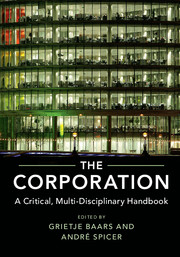Book contents
- Frontmatter
- Contents
- List of Contributors
- Acknowledgements
- Introduction: Why the Corporation?
- PART I DISCIPLINARY OVERVIEWS
- 1 The Corporation in History
- 2 The Corporation in Legal Studies
- 3 The Corporation in Economics
- 4 The Corporation in Sociology
- 5 The Corporation in Anthropology
- 6 The Corporation in Political Science
- 7 The Corporation in Geography
- 8 The Corporation in Accounting
- 9 The Corporation in Management Studies
- PART II INTERDISCIPLINARY THEMATIC CHAPTERS
- 1 The Evolution of the Corporate Form
- 2 The Multinational Corporate Group
- 3 The Financialization of the Corporation
- 4 Corporate Value Chains
- 5 Corporate Citizenship
- 6 The Corporation and Crime
- 7 The Corporation and Ideology
- 8 Corporation and Communities
- 9 Corporations and Resistance
- 10 Alternatives to the Corporation
- Index
- References
6 - The Corporation in Political Science
from PART I - DISCIPLINARY OVERVIEWS
Published online by Cambridge University Press: 31 March 2017
- Frontmatter
- Contents
- List of Contributors
- Acknowledgements
- Introduction: Why the Corporation?
- PART I DISCIPLINARY OVERVIEWS
- 1 The Corporation in History
- 2 The Corporation in Legal Studies
- 3 The Corporation in Economics
- 4 The Corporation in Sociology
- 5 The Corporation in Anthropology
- 6 The Corporation in Political Science
- 7 The Corporation in Geography
- 8 The Corporation in Accounting
- 9 The Corporation in Management Studies
- PART II INTERDISCIPLINARY THEMATIC CHAPTERS
- 1 The Evolution of the Corporate Form
- 2 The Multinational Corporate Group
- 3 The Financialization of the Corporation
- 4 Corporate Value Chains
- 5 Corporate Citizenship
- 6 The Corporation and Crime
- 7 The Corporation and Ideology
- 8 Corporation and Communities
- 9 Corporations and Resistance
- 10 Alternatives to the Corporation
- Index
- References
Summary
Introduction
In spite of the obvious centrality of the corporation in contemporary capitalist society, the attention to the role of the corporation in national, transnational and global politics within the discipline of political science is uneven and in some places rather scant. A search for the key words ‘corporation’ and ‘corporate’ in the abstracts of all articles that have appeared in the last ten years in the most highly ranking political science journal, the American Political Science Review, produced a mere five hits, of which only two dealt with corporate political power. Indeed conventional, ‘general’ political science, often presents itself as the study of formal political institutions, such as government and parliament; political actors directly operating within those institutions, such as political parties; and processes leading to formal political outcomes such as elections and public policy making (for a representative introductory textbook not mentioning anything relating to the political role of corporations, see Colomer, 2010). With regard to public policy making corporate power is sometimes indirectly addressed through the analysis of interest groups and their role in shaping policy outcomes, but often without recognizing the often privileged position of business groups or corporate capital as a source of power.
More explicit analyses of the role of corporations – or their representatives – as political actors, are to be found above all in those fields – usually situated within the sub-discipline of international relations (IR)/international political economy (IPE), which explicitly study governance at levels beyond the nation-state. The focus here is on large, especially transnational corporations, who are arguably the most politically significant corporate actors (Wilks, 2013: 32–37). Still, here too the role of corporate power is often ignored even in policy areas where essential corporate interests are at stake, such as with all forms of socio-economic regulation, and where one at least might suspect an important degree of corporate influence. In sum, although this chapter will review diverse literatures in which the corporation plays a more or less prominent role, it remains a relatively marginal subject within mainstream (comparative) political science.
- Type
- Chapter
- Information
- The CorporationA Critical, Multi-Disciplinary Handbook, pp. 134 - 159Publisher: Cambridge University PressPrint publication year: 2017
References
- 3
- Cited by



